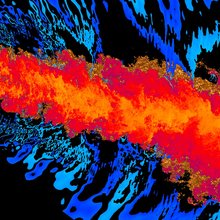Environmental Fluid Mechanics

Physics-informed machine learning
Dynamic Mode Decomposition (DMD)
DMD is a method for dynamical system analysis and prediction from high-dimensional data. Based on the power of Singular Value Decomposition (SVD), DMD is able to extract the low-rank structure from the data as well as separating temporal and spatial features. The close connections between DMD and the Koopman operator provide theory to interpret the capability of this equation-free, data-driven method. In our research, we are taking advantage of the DMD approach to accelerate multiscale simulations. The accuracy and efficiency of DMD in learning dynamics are explored both analytically and numerically.
Information-theoretic We are investigating how data collected at different scales can inform models and estimates at a different scale within a multi-resolution modeling framework. This is necessary because of the mismatch among data resolution, practical needs, accuracy of the models and computational memory requirements. Bidirectional scaling (moving from fine-scale to coarse-scale and vice versa) is formulated within a probabilistic framework, taking advantage of information-theoretic quantities that allow quantification of the transfer of information across scales. Development of a physics-based machine learning approach for mesoscopic model selection, applied to the two-dimensional stochastic Ginzburg-Landau equation
Data-driven equation discovery for coarse graining
We use Monte Carlo simulation data for learning an equation for the probability density function. Using this framework, we devise a general technique for coarse graining in both probability and phase space.
